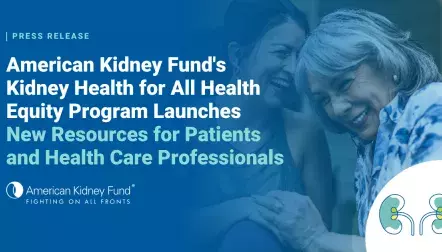
Blog post
Celebrate National Minority Donor Awareness Week: Become a donor

Throughout National Minority Donor Awareness Week (celebrated in August), many dedicated individuals and organizations across the country will come together to endorse the critical need for organ donation, particularly among communities of color.
As we celebrate the generosity of those who have made possible the "gift of life" through organ and tissue donation, we should pause for a moment to understand how much more work lies ahead of us. The need for organ donors, especially among people of color, has never been greater.
High blood pressure and diabetes are the two most common causes of kidney failure in the United States. Black, Hispanic and Asian Americans are more likely to suffer from these conditions and to develop kidney failure. Today, more than 92,000 people are on the waiting list for a kidney transplant in the United States — of which 64% are people of color.
Every 10 minutes, a person is added to the waiting list.
Every day, 18 people on the waiting list die due to a shortage of organ donors.
As a transplant surgeon, it is my mission to help my patients with organ failure return to a productive, healthy life — something that can only be achieved through the gift of transplantation. I serve another role in transplantation as well. I am part of a team of hundreds of transplant professionals, people living with transplants and donor families from across the country who voluntarily serve on committees for the nonprofit organization United Network for Organ Sharing (UNOS). UNOS is contracted by the federal government to oversee organ allocation and transplantation activity in the United States. I currently serve as the Chair of the Minority Affairs Committee, which is dedicated to ensuring fair and equal access to organ transplantation for people of color. We review policies as they are developed to ensure people of color are not disadvantaged in their access to transplantation or organs. We work very hard to make sure that the system is as fair as possible to all groups of people given the severe shortage of organs for transplantation.
Several myths prevent individuals from registering as organ donors. One myth is that medical professionals will not try to save you in an emergency if you have signed up on your driver's license or state donor registry. Nothing could be further from the truth. As doctors, we strive to heal all our patients. When someone comes into the emergency room, every effort is made to save that person's life. It is only after we have exhausted all possible medical treatment options and death has been verified that a separate team of dedicated donation professionals proceeds in carrying out the wishes of individuals who wanted to be organ and tissue donors. It is at this difficult time that loved ones can make the greatest gift of all.
A single organ donor can save as many as 50 lives.
You can help: register to be an organ or tissue donor. Share your wish to ben organ donor with your family, and share this message with your family and friends on social media.
Organ transplantation saves about 79 lives every day in this country. That number could be so much higher if there were only more donors. As we celebrate National Minority Awareness Week, please consider the people of color who are in need. Please give them hope by signing up to be an organ, eye and tissue donor.





